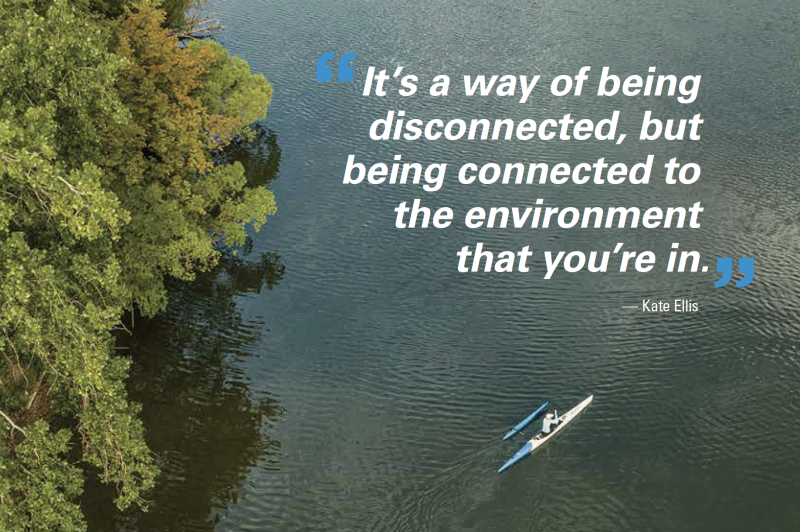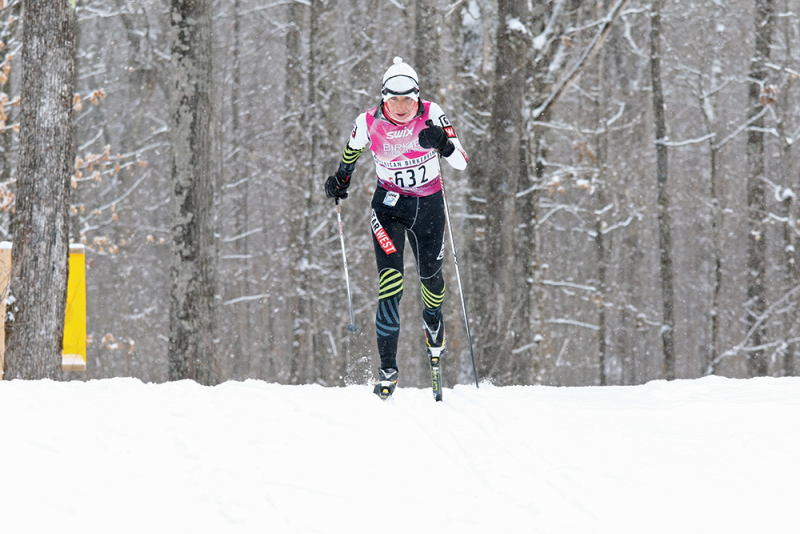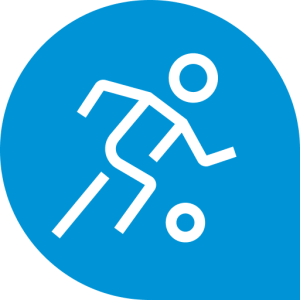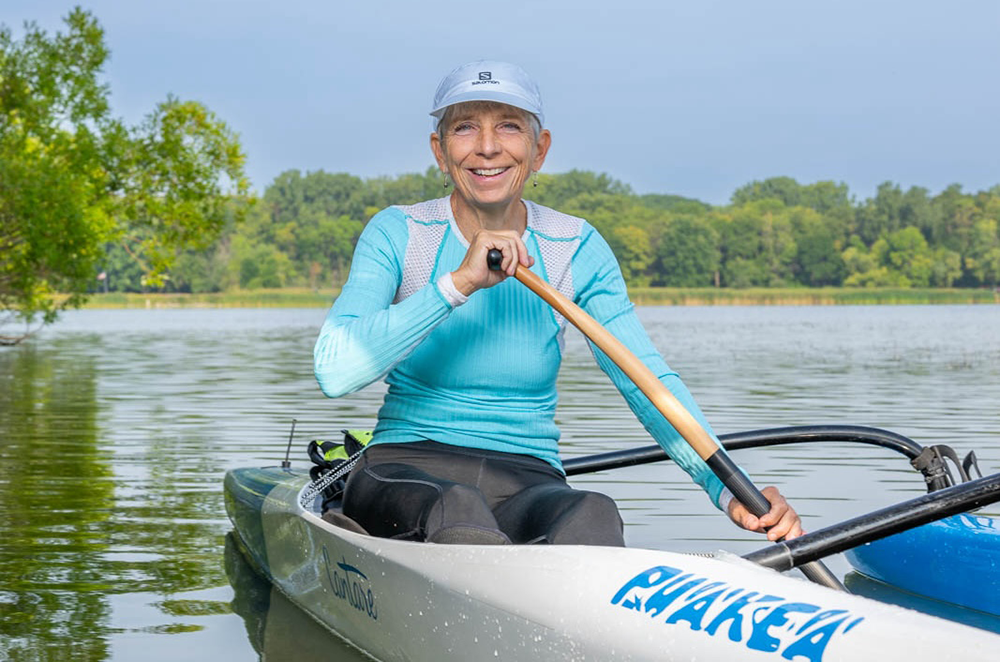Just awesome. That’s how Blue Cross member Kate Ellis describes the feeling she gets whenever she dips a canoe paddle in the water, glides across the snow on her cross-country skis, or carves her way through a mountain trail on her bike.
“It’s freedom. It really and truly is,” says Ellis, 67. “Your heightened senses of everything around you, especially in this age where people are on their phone all the time and connected. It’s a way of being disconnected, but being connected to the environment that you’re in.”
For Ellis, that environment is always changing. The masters-level world champion Nordic skier and long-distance canoe racer retired from ski instructing at a Twin Cities high school five years ago. She and her husband sold their home in Roseville, customized a camper van and hit the road. They live in the van six months out of the year and in a home in British Columbia during the winter to take advantage of the skiing. During the warm months, Ellis and her husband travel the country to canoe, bike, hike and explore new areas. They also paddle competitively — and still race on their skis in the winter. Staying active has helped Ellis stay fit and healthy into her 60s.
Though she knows not everyone is eager to adopt her lifestyle, she serves as inspiration to others her age to get out and try new things, and develop healthy habits.
Get outside
Whether you enjoy canoeing on the lake, taking your dog for a walk, or meeting a friend at a local park, spending time in the great outdoors can help you lead a happier life.
According to the United States Forest Service, spending time outside provides a variety of health benefits. For example, studies have shown that when you’re outside and in touch with nature, you often become more relaxed. The act of simply being active outside can help ease stress, lower your risk of depression, and reduce muscle tension and your heart rate.

Finding passions
Talking from her van, parked in a friend’s driveway in Ketchum, Idaho, earlier this summer, Ellis was just a week removed from competing in the Gorge Downwind Champs, a canoe race on the Columbia River Gorge. She paddled her outrigger canoe 13.5-miles in two hours and 28 minutes for a 10th-place finish in her age group.
“I was happy with it,” she says. “I don’t train like I used to. Considering that, I was very happy with how I did.”
Growing up in Wisconsin before Title IX created equal opportunities for females in sports, Ellis couldn’t have imagined taking part in such events. The only sport available to her as a child was track, which she recalled being “pretty pathetic.” But she found ways to stay active and discovered the joy of paddling early on.
“I just have always loved to be in motion,” she says. “Even though I didn’t necessarily do sports in school, I was always running around. My family had a cottage in Ontario that we would go to in the summer and I could canoe and explore and I think that had a huge impact on me.” Ellis went to college at the University of Wisconsin-Madison, earned a degree in art and had a career for a while as an art director for an ad agency. She moved to the Twin Cities in the 1980s, working and raising two kids, and running when she could. She took part in numerous marathons and took up cross country skiing after a friend’s suggestion — at the age of 38. Skiing was much easier on her joints than running and the sport soon became a passion. “I thought, this is so much better because you get to glide,” Ellis says. “You don’t have to run down hills. So that was my introduction to Nordic skiing and I just really loved it immediately.”
Ellis has since competed in ski races around the world, most at least 40 kilometers (or about 25 miles) in length. She has won several world championships in her age group and has turned heads, especially early on as a newcomer to a sport with many known athletes. She also turned the activity into a new career, leaving the advertising industry to coach a high school team and run summer programs for youth and adults before she retired.
Did you know?

Start moving, whether it’s a walk around the block, picking up a new activity or reconnecting with one you used to do. Doing it with a friend or joining a group helps with motivation and keeping you on track.
Staying fit
Turning canoeing into a competitive venture also came later in life. Ellis, who now owns three canoes with her husband, has raced solo and with partners, in races ranging in length from 6 miles to a grueling 120-mile marathon. That big race, the AuSable River Canoe Marathon, is a nonstop event that can take 14-19 hours, including portages —carrying the canoe — around six dams. Ellis has finished as high as 14th place in the event, which attracts more than 100 teams each year.
To stay in shape for endurance races, whether paddling or skiing, Ellis commits several hours a week to low-intensity workouts — short sessions where she pushes hard, along with strength training. In the canoe, she uses 6-mile races as time trials. Before a marathon, she tries to get around 200 hours of training completed in a canoe.
After decades of training, she is in tune with her body and its limitations and won’t exceed them.
“By following a training plan, you are able to increase the amount of work you do and then allow your body to absorb the stress by decreasing either intensity or hours,” she says. “Going hard is painful, but if it feels like I’m going to injure myself, I back off. If I’m really tired from training, I’ll take a day off, sometimes two days.”
Ellis sets goals for herself, so she has something to strive for. But those goals don’t always include where she finishes a race.
“For skiing it was just to have a really smart race and empty the tank so that no matter what the results, that’s the best I could do and I’m really happy with that,” she says.
Ellis also tries to stick to a balanced diet — eating as clean as she can, avoiding junk food and fast food. But she isn’t so strict that she won’t indulge in chocolate or ice cream from time to time.

Mindful connections
You might think that living in a van could be isolating, but Ellis says the opposite. She and her husband are very close. She jokes that they still have a great relationship despite their very snug living quarters, noting that the reality is that most of their time is spent outdoors.
Through their activities, the couple has met many friends around the country. In Ketchum, they were staying with a friend that helped them through the COVID-19 pandemic, when they had to stay put for a winter because Canada’s borders were closed. Ellis has had a variety of canoe partners in double competitions over the years, enabling her to build lasting bonds with other athletes. And the ski community in British Columbia is also tight-knit.
Outside of sports, Ellis is still passionate about art. She enjoys creating jewelry, drawing and printmaking. She is also an avid reader and likes a good puzzle. Those activities contribute to her mental wellness, she says.
Throughout her life, Ellis says suggestions from others opened doors to activities that she loves. She encourages people to explore and to get outside their comfort zone, as you never know what might become a new source of joy.
“I think just being curious, exploring new things, new places, meeting new people, being physically active, has all helped me stay fit both in mind and body,” Ellis says. “I’m healthy, I’m all here mentally and I’m able to live this life. I feel so fortunate. I really do.
Start moving, whether it’s a walk around the block, picking up a new activity or reconnecting with one you used to do. Doing it with a friend or joining a group helps with motivation and keeping you on track.
Start Skiing

Nordic skiing is often called a lifetime sport, as it’s an activity you can do at any age. If you’re interested in getting started, check out loppet.org to find lessons, trails and other helpful resources.


